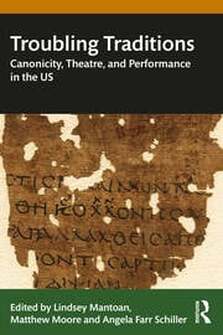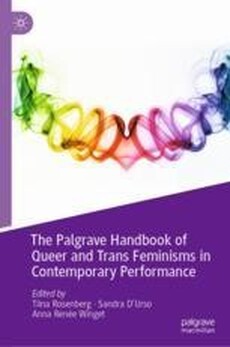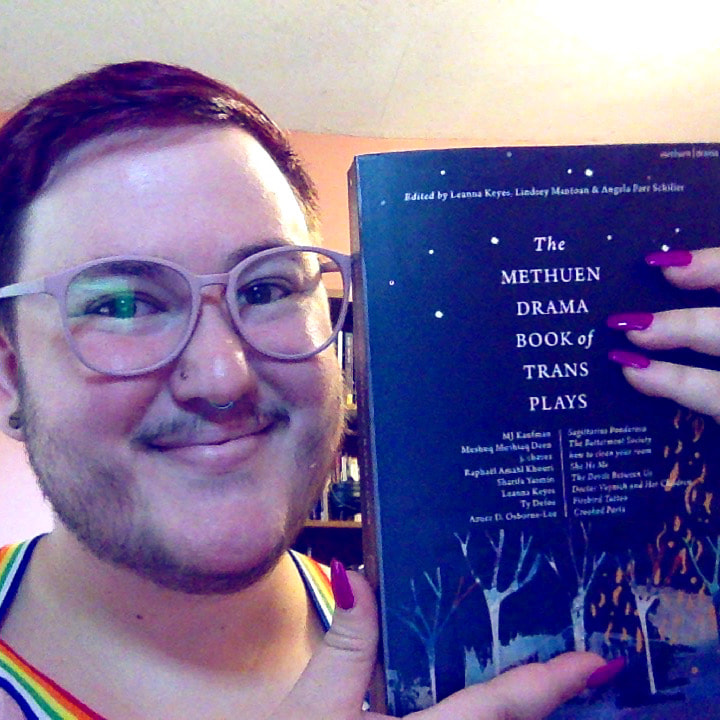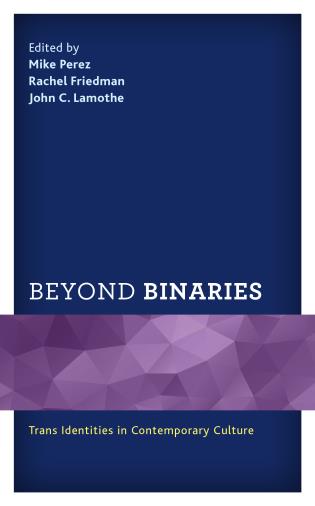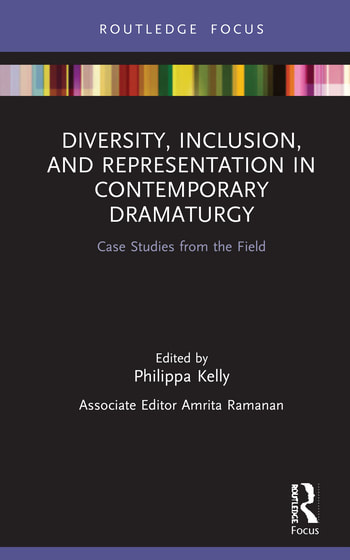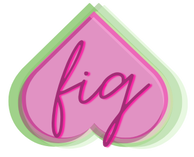PLAYS
The Skin of Other Men (full length)
|
On one of her most famous art pieces, Barbara Kreuger wrote, “You construct intricate rituals which allow you to touch the skin of other men.” This play as a love letter to all the people who grew up steeped in American masculinities and now struggle to find the intimacies they desire. sample here
|
|
Mother (full length)
|
Mama is nearing death and she has finally decided what she wants her daughters to do with her body when she passes: eat it. What unfolds is a story of womanhood, motherhood, and connection to ancestors, told in dreamscapes and dough, bread and song. sample here
|
coming up:
|
visit my New Play Exchange profile for script samples and more information.
RESEARCH/ACADEMIC PUBLICATIONS
As I writer, I strive to balance theory with practical application. I am not interested in writing just for the academy. I want to write for theater-makers, for artists, for queer folx, for people like me who rarely find writing that represents us in the canon. I am often writing to fill gaps in institutional knowledges, to call out into a void and hope other artists echo back. I write about queer & trans performance, about making theater in and for community, about un-doing as much as doing.
Toward and Away: The Dramatic Tension of a Queer & Trans Canon (November 2021)
|
This paper explores the tensions of creating a queer or trans canon: do our current play analysis models even offer techniques to analyze queer play structure? does a queer canon have to exist in relation to or in a similar fashion as the traditional Western canon? can a queer canon exist as a stable project, or does it stop being queer the minute it is solidified? what texts are part of our queer canon past, and what do we owe them in the canonizing projects of our future? how do queer theater-makers envision new ways of archiving and canonizing non text-based or embodied performances?
This essay is included as a chapter in Troubling Traditions: Canonicity, Theatre, and Performance in the US, Available Here. Read the chapter here. |
Lip-Syncing for Our Lives: Queering Dissent in Queer & Now: a Lip-sync Spectacular (September 2021)
|
Through a discussion of theory in practice, this paper proposes lip sync as a queer and feminist medium for reading and performing gender. Lip sync offers performative possibilities of juxtaposition, contradiction, and expansion—making room for trans theories of temporality in practice. Additionally, relying on queer temporality studies, film analysis, and queer and trans theories (Grosz, Edelman, Elliott-Smith, etc.) this paper examines the queer and trans feminist questions presented by the performance. Rather than asking how we can make space in drag for trans folx, this paper argues that trans drag performers expand the possibilities of drag altogether.
This essay is included as a chapter in The Palgrave Handbook of Queer and Trans Feminisms in Contemporary Performance, Available Here. |
how to tell time (when you are trans and processing trauma) (June 2021)
|
*Named a Lambda Literary Award Finalist*
This essay serves as a critical introduction for j. chavez' play how to clean your room (and remember all your trauma). Using queer and trans temporalities to explore the structure and aesthetics of chavez' play, I draw connections between puppets, the stars, and living in trans time. The essay is published as part of the first ever anthology of trans plays, The Methuen Drama Book of Trans Plays, Available Here. |
Schrödinger’s Dick: The Transgender Reveal Trope in Boy Meets Girl (January 2021)
|
Using Eric Schaeffer’s 2014 film Boy Meets Girl as a case study, this paper interrogates the ways the male gaze fails to produce the female subject when that subject is transgender. This paper centers around a film trope the author names “the Reveal,” or the moment in which a transgender character is revealed to be transgender, usually through the visible exposure of genitals. By analyzing the temporality of Ricky’s (the trans woman and main character in question) female subjectivity, this paper questions if Mulvey’s “male gaze” theory functions only within a cisnormative structure, arguing that the gaze both produces her as a feminine subject and denies her female subjectivity.
This essay is included as a chapter in Beyond Binaries: Trans Identities in Contemporary Culture, Available Here. |
The Name (isn’t a) Game: New Explorations in Trans Applied Theatre (2020)
|
Building on work in my MFA thesis, this essay details one aspect of my trans applied theatre work: naming. Applied theatre work offers a space to use theatre techniques to unpack and work through community issues. For this group of transgender applied theatre artists, the task at hand is naming: what does it mean for a trans person to choose a new name? to reconnect with a given name? to ask for community support in naming? This piece tracks the process and experiences of one troupe exploring trans naming through a new set of applied theatre exercises. These exercises culminate in Trans Naming Rituals—performances where trans participants claim their identities and ask for community recognition.
This essay is included as a case study in Diversity, Inclusion, and Representation in Contemporary Dramaturgy, Available Here. |
TRANSgressive Acts: Adapting Applied Theatre Techniques for a Transgender Community (MFA thesis)
This MFA Thesis traces my work as a joker (a la Theatre of the Oppressed) and facilitator through a three-year-long project with a trans applied theatre troupe. The troupe explored several techniques, including Image Theatre, Playback Theatre, storytelling exercises, and somatic movement. In three semester-long workshops, the troupe focused work around three sets of techniques. In the first workshop, the troupe explored the community-based interview process of Undesirable Elements, as designed by Ping Chong in collaboration with Talvin Wilks and Sara Zatz. These techniques were interrogated using queer and trans temporalities. In the second unit, the troupe practiced Augusto Boal’s “Cops in the Head” techniques from The Rainbow of Desire, utilizing a sociological perspective to examine the “ghosts” these techniques produce. In the final semester, I devised techniques specifically for and about transgender people, invoking trans theory and queer theory to explore issues of naming, trauma, and trans possibilities. Through this work I argue that techniques designed for cisgender bodies require adaptation to find success in transgender communities. I argue that the future of this work is not transforming existing techniques to suit our needs, rather it is creating techniques with transgender bodies and identities at the core.
Read my thesis here.
Read my thesis here.

